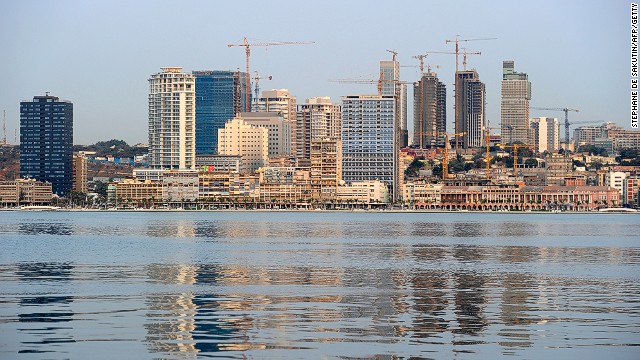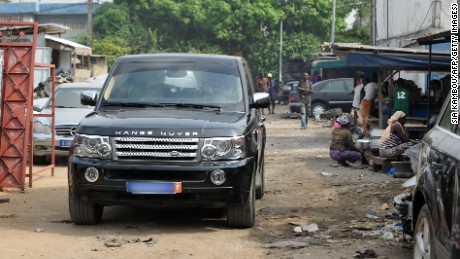Rich getting richer, poor getting poorer? Africa's inequality struggle

(CNN)Fast cars thunder down tree-lined avenues. Luxury yachts sway in the sparkling marina, while diners in trendy beach-side restaurants clink Champagne glasses, enjoying the gentle ocean breeze.
This isn't Miami or the French Riviera, but Luanda, the capital of Angola. The city is a poster-child for the extraordinary economic boom experienced by many African nations since the early 2000s, its crane-filled skyline testament to the breakneck speed of construction seen in recent years.
But it's not just Luanda. From million-dollar mansions dotted along Mozambique's coastline, to high-end shopping emporiums in Nigeria's metropolises, oases of affluence have sprung across the continent which has been home to seven of the 10 fastest-growing economies in the world.
For a section of the population, these favorable statistics have translated into enormous gains. Numbers of multimillionaires in Africa are predicted to rise by 59% in the next 10 years -- the highest growth of any region in the world. Nigeria is now one of the top markets for Champagne and, as growth stagnates in Europe and slows in China, purveyors of luxury goods increasingly look to Africa as their next frontier.
Many have dubbed this reversal in fortunes "Africa Rising," a term encapsulating the continent's jubilant ascent to prosperity after decades of post-colonial strife marred by civil wars and sluggish growth.
Predicted growth of ultra-high net worth individuals -- worth more than $30 million -- in different regions for the next 10 years.
False calculation
But parallel to this triumphant narrative, a startling number of people still live in abject poverty.
Almost one out of every two Africans survives on $1.25 a day or less, and the continent hosts six out of 10 of the world's most unequal countries. Africa's population is projected to triple to 1.25 billion by 2050, but youth prospects remain dire across the board. In Ethiopia and Nigeria, the continent's largest economy, the majority of young people get by on less than $2 a day.
"On the one hand you hear glowing stories of growth and prosperity, shiny new buildings being built, big cars, nice homes, and lots of consumption. But Africa is producing bigger and bigger numbers of poor people, so poor so desperate" says Ali Mufuruki, CEO of Tanzania's Infotech Investment Group and member of the International Monetary Fund's Group on sub-Saharan Africa.
He adds that the growth statistics measure only those who are active participants in the economy, leaving out the marginalized masses who often find themselves in sporadic, informal employment.
Rich getting richer
Reasons for these diametrically different realities are complex, but the main culprit seems to be the nature of the growth pattern which enabled the already wealthy to get richer, without a significant impact on the rest of the population.
Rakesh Rajani, a Tanzanian civil society activist, says that a lot of the growth has been driven by industries like mining, oil and gas and, to some extent, tourism -- all of which don't employ a huge number of people. "You can grow by 7 or 8%, but it's not a broad-based growth, so most people don't benefit from it. So at the same time that you have growth, there is also a growing inequality between a small elite which is benefiting from this -- sometimes literally only a few thousand people -- and millions of the population who are stuck," he adds.
Colonial legacy has long cast a dark shadow over the continent, and in South Africa, the world's most unequal country, it continues to cause lasting damage to its prospects.
"Everything was skewed racially -- education, access to finance, access to land," says Haroon Bhorat, professor of economics at the University of Cape Town.
"When we tried to encourage growth post 1994 (end of apartheid), it was only those who already had capital and good education that gained from it," he adds.

Knowledge is power
Yet. it's not all doom and gloom. Experts say that Africa can start closing the inequality gap with the right set of policies, out of which producing a skilled workforce comes as a top priority. "[The] education that Africa needs is one that is skills-based, technologically grounded and globally competitive," says Said Adejumobi, head of the governance and public administration division at the United Nations Economic Commission for Africa.
Extractive industries like mining are susceptible to tax avoidance which, even when legal, stops the host country from getting the best deal in exchange for its natural resources. A report by Tax Justice Network-Africa and ActionAid International estimates that Kenya, Uganda, Tanzania and Rwanda lose up to $2.8 billion a year from all tax incentives and exemptions. The charity Christian Aid highlights the example of Sierra Leone whose tax expenditure -- the amount of revenues lost by granting of tax incentives and exemptions -- amounted to more than eight times the health budget and seven times the education budget in 2012.
"In a knowledge driven world, a colonially-molded education which litters the entire continent can hardly play that role. It's a law and order educational system meant to serve a specific form of political regime and society. Africa needs to reinvent its educational system towards a modern competitive age," he adds.
Enforcing transparency in government deals is also crucial says Rajani, calling on both governments and international companies to be more open about their dealings, and start publishing contracts online for the public and journalists to scrutinize.
With Africa predicted to be home to nearly 40% of the global population by the end of the century, the pressure is mounting to find employment for the millions entering the labor market every year.
"Africa's population boom can be an asset or liability depending on the way it is managed," says Adejumobi. "If carefully planned, it would be Africa's greatest resource of economic transformation," he explains. "However, if poorly managed, they can be foot soldiers for deviant groups like Boko Haram and other anti-social forces on the continent."
When it comes to the much trumpeted "Africa Rising" term, Rajani says the reality is much more complex: "It doesn't make sense to speak in generalities, people who do that take Africa as one country. Africa has some amazing things happening and some awful things happening all at the same time."
No comments:
Post a Comment